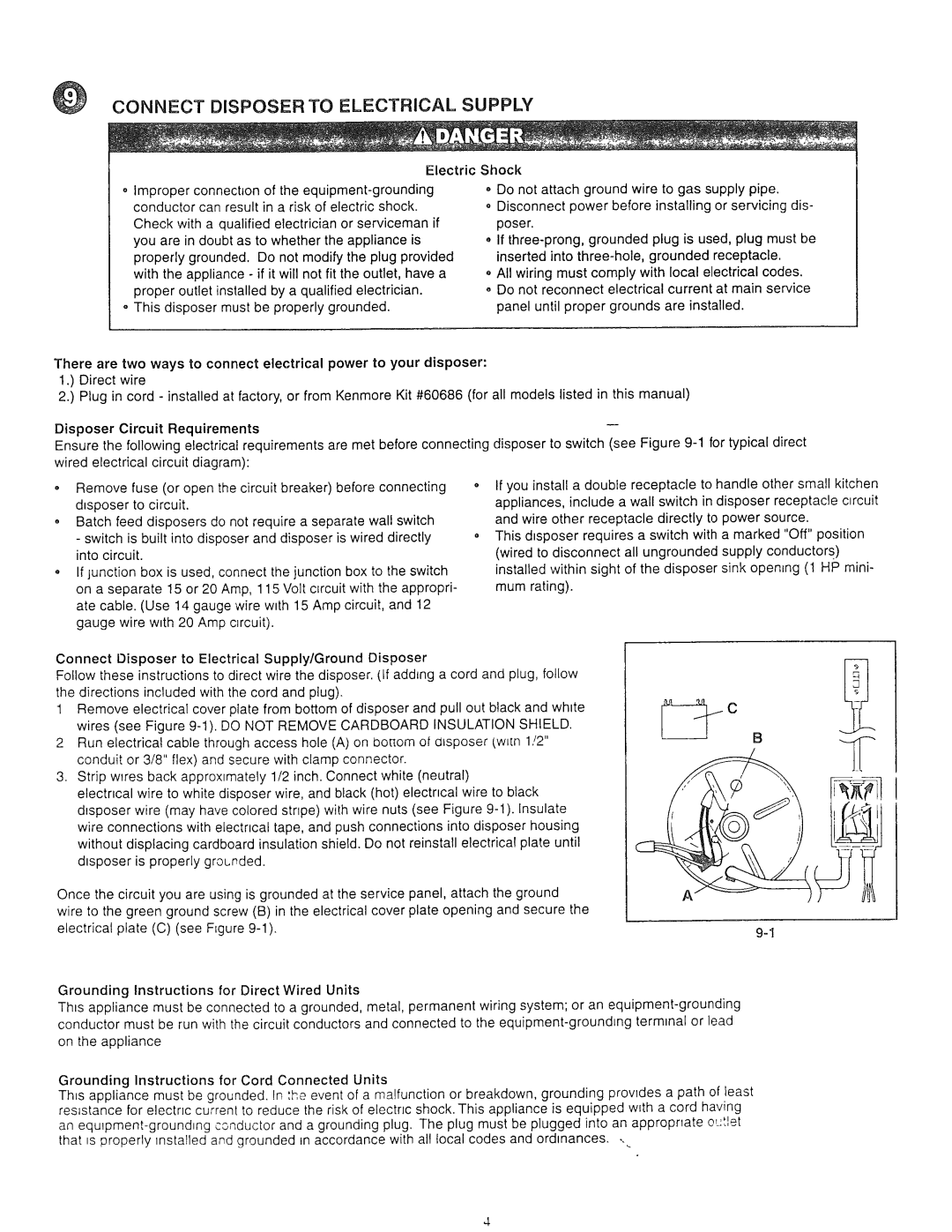
CONNECT DISPOSER TO ELECTRICAL SUPPLY
Electric
o Improper connection of the
Check with a qualified electrician or serviceman if you are in doubt as to whether the appliance is properly grounded. Do not modify the plug provided with the appliance - if it will not fit the outlet, have a proper outlet installed by a qualified electrician.
o This disposer must be properly grounded.
Shock
o Do not attach ground wire to gas supply pipe.
o Disconnect power before installing or servicing dis- poser.
*If
,,All wiring must comply with local electrical codes. o Do not reconnect electrical current at main service
panel until proper grounds are installed.
There are two ways to connect electrical power to your disposer: 1.) Direct wire
2.) Plug in cord - installed at factory, or from Kenmore Kit #60686 (for all models listed in this manual)
Disposer Circuit Requirements
w
Ensure the following electrical requirements are met before connecting disposer to switch (see Figure
-Remove fuse (or open the circuit breaker) before connecting d_sposer to circuit.
•Batch feed disposers do not require a separate wall switch - switch is built into disposer and disposer is wired directly into circuit.
oIf junction box is used, connect the junction box to the switch on a separate 15 or 20 Amp, 115 Volt c_rcuit with the appropri- ate cable. (Use 14 gauge wire with 15 Amp circuit, and 12 gauge wire with 20 Amp circuit).
°If you install a double receptacle to handle other small kitchen appliances, include a wall switch in disposer receptacle c_rcuit and wire other receptacle directly to power source.
°This d_sposer requires a switch with a marked "Off" position (wired to disconnect all ungrounded supply conductors)
installed within sight of the disposer sink opening (1 HP mini- mum rating).
Connect Disposer to Electrical Supply/Ground Disposer
Follow these instructions to direct wire the disposer. (if adding a cord and plug, follow the directions included with the cord and plug).
1Remove electrical cover plate from bottom of disposer and pull out black and white wires (see Figure
2Run electrical cable through access hole (A) on bo[tom ot cihsposer/w_[n 1/2"
conduit or 3/8" flex) and secure with clamp connector.
3.Strip wTres back approximately 1/2 inch. Connect white (neutral)
electrical wire to white disposer wire, and black (hot) electrical wire to black disposer wire (may have colored stripe) with wire nuts (see Figure
Once the circuit you are using is grounded at the service panel, attach the ground
wire to the green ground screw (B) in the electrical cover plate opening and secure the electrical plate (C) (see
Grounding Instructions for Direct Wired Units
Ths appliance must be connected to a grounded, metal, permanent wiring system; or an
on the appliance
Grounding Instructions for Cord Connected Units
Th_s appliance must be grounded. In ',heevent of a malfunction or breakdown, grounding provides a path of least resistance for electric current to reduce the risk of electric shock. This appliance is equipped with a cord having an
B
